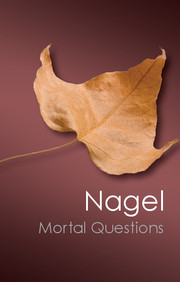Book contents
- Frontmatter
- Contents
- Preface
- Sources
- 1 Death
- 2 The Absurd
- 3 Moral Luck
- 4 Sexual Perversion
- 5 War and Massacre
- 6 Ruthlessness in Public Life
- 7 The Policy of Preference
- 8 Equality
- 9 The Fragmentation of Value
- 10 Ethics without Biology
- 11 Brain Bisection and the Unity of Consciousness
- 12 What is it like to be a bat?
- 13 Panpsychism
- 14 Subjective and Objective
- Index
- Frontmatter
- Contents
- Preface
- Sources
- 1 Death
- 2 The Absurd
- 3 Moral Luck
- 4 Sexual Perversion
- 5 War and Massacre
- 6 Ruthlessness in Public Life
- 7 The Policy of Preference
- 8 Equality
- 9 The Fragmentation of Value
- 10 Ethics without Biology
- 11 Brain Bisection and the Unity of Consciousness
- 12 What is it like to be a bat?
- 13 Panpsychism
- 14 Subjective and Objective
- Index
Summary
If death is the unequivocal and permanent end of our existence, the question arises whether it is a bad thing to die.
There is conspicuous disagreement about the matter: some people think death is dreadful; others have no objection to death per se, though they hope their own will be neither premature nor painful. Those in the former category tend to think those in the latter are blind to the obvious, while the latter suppose the former to be prey to some sort of confusion. On the one hand it can be said that life is all we have and the loss of it is the greatest loss we can sustain. On the other hand it may be objected that death deprives this supposed loss of its subject, and that if we realize that death is not an unimaginable condition of the persisting person, but a mere blank, we will see that it can have no value whatever, positive or negative.
Since I want to leave aside the question whether we are, or might be, immortal in some form, I shall simply use the word ‘death’ and its cognates in this discussion to mean permanent death, unsupplemented by any form of conscious survival. I want to ask whether death is in itself an evil; and how great an evil, and of what kind, it might be. The question should be of interest even to those who believe in some form of immortality, for one's attitude toward immortality must depend in part on one's attitude toward death.
- Type
- Chapter
- Information
- Mortal Questions , pp. 1 - 10Publisher: Cambridge University PressPrint publication year: 2012
- 9
- Cited by



